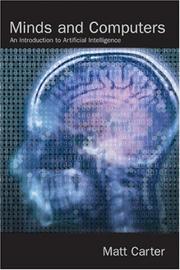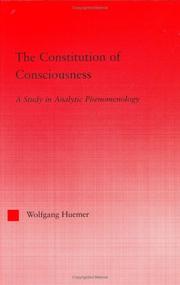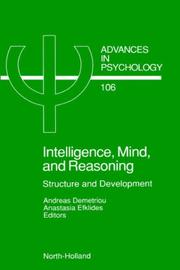| Listing 1 - 6 of 6 |
Sort by
|

ISBN: 0748629300 1280762446 9786610762446 9780748629305 9781280762444 6610762449 0748620982 9780748620982 0748620982 0748620990 9780748620999 9780748620982 Year: 2007 Publisher: Edinburgh : Edinburgh University Press,
Abstract | Keywords | Export | Availability | Bookmark
 Loading...
Loading...Choose an application
- Reference Manager
- EndNote
- RefWorks (Direct export to RefWorks)
Could a computer have a mind? What kind of machine would this be? Exactly what do we mean by 'mind' anyway?The notion of the 'intelligent' machine, whilst continuing to feature in numerous entertaining and frightening fictions, has also been the focus of a serious and dedicated research tradition. Reflecting on these fictions, and on the research tradition that pursues 'Artificial Intelligence', raises a number of vexing philosophical issues. Minds and Computers introduces readers to these issues by offering an engaging, coherent, and highly approachable interdisciplinary introduction to the P
Artificial intelligence --- Philosophy of mind. --- Mind, Philosophy of --- Mind, Theory of --- Theory of mind --- Philosophy --- Cognitive science --- Metaphysics --- Philosophical anthropology --- Philosophy. --- Philosophy of mind --- E-books --- Artificial intelligence.

ISBN: 1280226242 9786610226245 0203641787 113587509X 1135875081 0415971292 1138011681 Year: 2004 Publisher: London Routledge
Abstract | Keywords | Export | Availability | Bookmark
 Loading...
Loading...Choose an application
- Reference Manager
- EndNote
- RefWorks (Direct export to RefWorks)
Through the work of philosophers like Sellars, Davidson, and McDowell, the question of how the mind is related to the world has gained new importance in contemporary analytic philosophy. This book demonstrates that Husserl's phenomenological analyses of the structure of consciousness can provide fruitful insights for developing an original approach to these questions.
Constitution (Philosophy) --- Philosophy of mind. --- Phenomenology. --- Husserl, Edmund, --- Mind, Philosophy of --- Mind, Theory of --- Theory of mind --- Hu-sai-erh, --- Gusserlʹ, Ėdmund, --- Huserl, E., --- Khuserl, --- Husserl, E. --- Huserl, Edmund, --- Hūsirl, Idmūnd, --- הוסרל, אדמונד, --- 胡塞尔, E, --- Husserl, Edmund --- Husserl, Edmond --- Philosophy, Modern --- Philosophy --- Cognitive science --- Metaphysics --- Philosophical anthropology --- mental --- episodes --- retentional --- background --- logical --- space --- constitutive --- commitment --- transcendental --- idealism --- Phenomenology --- Philosophy of mind
Book
ISBN: 1783743018 178374300X 1783742992 9781783743001 9781783743018 9781783743025 1783743026 9781783744886 178374488X 1783742984 9781783742981 9791036516627 9781783742998 Year: 2018 Publisher: Cambridge, England : Open Book Publishers,
Abstract | Keywords | Export | Availability | Bookmark
 Loading...
Loading...Choose an application
- Reference Manager
- EndNote
- RefWorks (Direct export to RefWorks)
Consciousness is widely perceived as one of the most fundamental, interesting and difficult problems of our time. However, we still know next to nothing about the relationship between consciousness and the brain and we can only speculate about the consciousness of animals and machines. Human and Machine Consciousness presents a new foundation for the scientific study of consciousness. It sets out a bold interpretation of consciousness that neutralizes the philosophical problems and explains how we can make scientific predictions about the consciousness of animals, brain-damaged patients and machines. Gamez interprets the scientific study of consciousness as a search for mathematical theories that map between measurements of consciousness and measurements of the physical world. We can use artificial intelligence to discover these theories and they could make accurate predictions about the consciousness of humans, animals and artificial systems. Human and Machine Consciousness also provides original insights into unusual conscious experiences, such as hallucinations, religious experiences and out-of-body states, and demonstrates how ‘designer' states of consciousness could be created in the future. Gamez explains difficult concepts in a clear way that closely engages with scientific research. His punchy, concise prose is packed with vivid examples, making it suitable for the educated general reader as well as philosophers and scientists. Problems are brought to life in colourful illustrations and a helpful summary is given at the end of each chapter. The endnotes provide detailed discussions of individual points and full references to the scientific and philosophical literature.
Consciousness. --- Apperception --- Mind and body --- Perception --- Philosophy --- Psychology --- Spirit --- Self --- Philosophy of mind. --- Mind, Philosophy of --- Mind, Theory of --- Theory of mind --- Cognitive science --- Metaphysics --- Philosophical anthropology --- experience --- brain --- states of consciousness --- scientific study of consciousness --- artificial intelligence --- Altered state of consciousness --- Monetary system --- Neuron --- Universe

ISBN: 9780080867601 008086760X 0444897143 9780444897145 9786611778958 1281778958 Year: 1994 Publisher: Amsterdam [The Netherlands] ; New York : North-Holland,
Abstract | Keywords | Export | Availability | Bookmark
 Loading...
Loading...Choose an application
- Reference Manager
- EndNote
- RefWorks (Direct export to RefWorks)
This volume aims to contribute to the integration of three traditions that have remained separate in psychology. Specifically, the developmental, the psychometric, and the cognitive tradition. In order to achieve this aim, the text deals with these three aspects of human knowing that have been the focus of one or more of the three traditions for many years. Answers are provided to questions such as the following: What is common to intelligence, mind, and reasoning? What is specific to each of these three aspects of human knowing? How does each of them affect the functioning and development of
Philosophy --- Cognitive styles. --- Intellect. --- Philosophy of mind. --- Reasoning (Psychology). --- Experimentele psychologie --- denken, begripsvorming en problem solving. --- Cognitive styles --- Intellect --- Philosophy of mind --- Reasoning (Psychology) --- Mind, Philosophy of --- Mind, Theory of --- Theory of mind --- Cognitive science --- Metaphysics --- Philosophical anthropology --- Human intelligence --- Intelligence --- Mind --- Ability --- Psychology --- Thought and thinking --- Styles, Cognitive --- Cognition --- Personality and cognition
Periodical
ISSN: 15937879 18601839 Year: 2000 Publisher: Torino : Rosenberg & Sellier,
Abstract | Keywords | Export | Availability | Bookmark
 Loading...
Loading...Choose an application
- Reference Manager
- EndNote
- RefWorks (Direct export to RefWorks)
Mind & Society examines the relationships between mind and action and between action and socio-economic phenomena. This includes the following topics: the concept of mind of social actor; cognitive models of reasoning; decision-making and action; computational and neural models of socio-economic phenomena; and related topics.
Sociology --- Philosophy of mind --- Knowledge, Theory of --- Philosophy and social sciences --- Arts and Humanities --- Philosophy --- Knowledge, Theory of. --- Philosophy and social sciences. --- Philosophy of mind. --- Philosophie de l'esprit --- Connaissance, Théorie de la --- Philosophie et sciences sociales --- psychologie --- psychology --- samenleving --- society --- besluitvorming --- decision making --- sociale economie --- socioeconomics --- denken --- thinking --- kenvermogen --- cognition --- Social Psychology --- Sociale psychologie --- Mind, Philosophy of --- Mind, Theory of --- Theory of mind --- Cognitive science --- Metaphysics --- Philosophical anthropology --- Social sciences and philosophy --- Social sciences --- Epistemology --- Theory of knowledge --- Psychology --- Théorie de la connaissance
Book
ISBN: 1283646277 1400845483 9781400845484 Year: 2012 Publisher: Princeton, NJ : Princeton University Press,
Abstract | Keywords | Export | Availability | Bookmark
 Loading...
Loading...Choose an application
- Reference Manager
- EndNote
- RefWorks (Direct export to RefWorks)
From the family to the workplace to the marketplace, every facet of our lives is shaped by cooperative interactions. Yet everywhere we look, we are confronted by proof of how difficult cooperation can be--snarled traffic, polarized politics, overexploited resources, social problems that go ignored. The benefits to oneself of a free ride on the efforts of others mean that collective goals often are not met. But compared to most other species, people actually cooperate a great deal. Why is this? Meeting at Grand Central brings together insights from evolutionary biology, political science, economics, anthropology, and other fields to explain how the interactions between our evolved selves and the institutional structures we have created make cooperation possible. The book begins with a look at the ideas of Mancur Olson and George Williams, who shifted the question of why cooperation happens from an emphasis on group benefits to individual costs. It then explores how these ideas have influenced our thinking about cooperation, coordination, and collective action. The book persuasively argues that cooperation and its failures are best explained by evolutionary and social theories working together. Selection sometimes favors cooperative tendencies, while institutions, norms, and incentives encourage and make possible actual cooperation. Meeting at Grand Central will inspire researchers from different disciplines and intellectual traditions to share ideas and advance our understanding of cooperative behavior in a world that is more complex than ever before.
Social interaction --- Cooperation --- Human interaction --- Interaction, Social --- Symbolic interaction --- Exchange theory (Sociology) --- Psychology --- Social psychology --- History. --- History --- Adaptation and Natural Selection. --- George C. Williams. --- Mancur Olson. --- The Logic of Collective Action. --- Theory of Mind. --- adaptation. --- anti-coordination games. --- assurance games. --- by-product mutualism. --- by-product theory. --- cheaters. --- coalitional psychology. --- coercion. --- collective action dilemmas. --- collective action. --- common knowledge. --- common-pool resources. --- conflict. --- consilience. --- conventions. --- cooperation. --- cooperative behavior. --- coordination problems. --- coordination. --- criticality. --- cultural group selection. --- culture. --- emergence. --- evolution. --- evolutionary biology. --- fortuitous benefits. --- free riding. --- generosity. --- groups. --- incentives. --- indirect reciprocity. --- institutions. --- judgment. --- labor division. --- language. --- life sciences. --- mathematics. --- mentalizing. --- natural selection. --- norms. --- organizations. --- phylogeny. --- power law curves. --- public goods. --- reciprocity. --- selective benefits. --- small groups. --- social behavior. --- social interactions. --- social sciences. --- trust.
| Listing 1 - 6 of 6 |
Sort by
|

 Search
Search Feedback
Feedback About
About Help
Help News
News